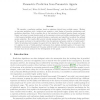Free Online Productivity Tools
i2Speak
i2Symbol
i2OCR
iTex2Img
iWeb2Print
iWeb2Shot
i2Type
iPdf2Split
iPdf2Merge
i2Bopomofo
i2Arabic
i2Style
i2Image
i2PDF
iLatex2Rtf
Sci2ools
CORR
2016
Springer
2016
Springer
Parametric Prediction from Parametric Agents
We consider a prediction problem based on opinions elicited from multiple agents. Making an accurate prediction with a minimal cost requires a joint design of incentive mechanisms and prediction algorithms. Such a problem lies at the interface of statistical learning theory and game theory, and arises in many domains such as the consumer surveys and mobile crowdsourcing. Under a fairly general problem setup, we jointly design a mechanism and algorithm to achieve the optimal system objective. Our results offer several valuable engineering insights. When the costs incurred by the agents are linear in the exerted effort, then the optimal mechanism calls for a “crowd-tender”, where the principal only employs the agent with the lowest bid. When the costs are quadratic, then it is optimal to use a “crowd-sourcing” mechanism that employs multiple agents at the same time. Synthetic simulations demonstrate the gains achieved under our proposed mechanism, as compared to those that do ...
Related Content
| Added | 01 Apr 2016 |
| Updated | 01 Apr 2016 |
| Type | Journal |
| Year | 2016 |
| Where | CORR |
| Authors | Yuan Luo, Nihar B. Shah, Jianwei Huang, Jean C. Walrand |
Comments (0)

